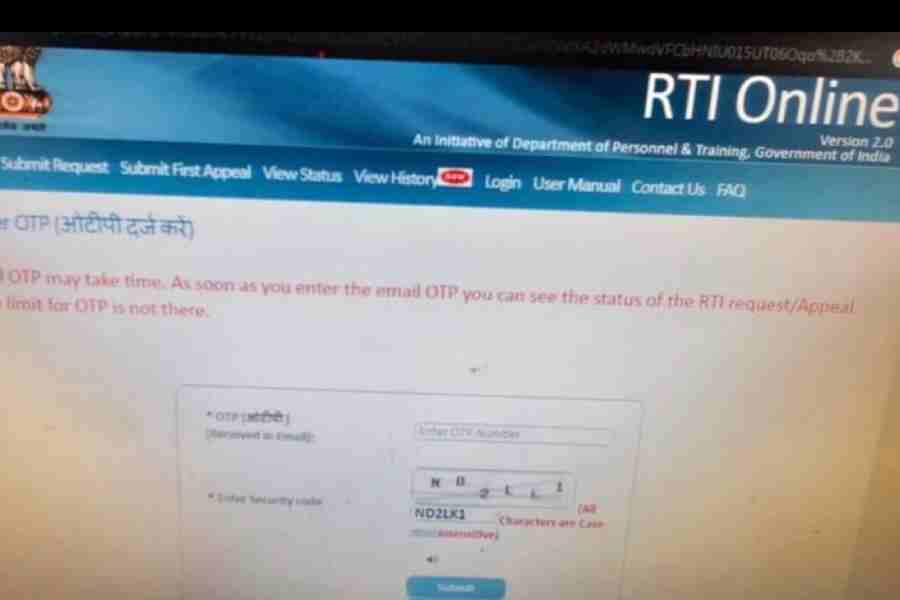Activists trying to use India’s Right to Information Act portals to track the status of their own queries have encountered a one-time-password feature they claim works inconsistently, hindering their access to documents.
The OTP-via-email feature works sporadically with unusually long wait times or stalls progress towards the status of queries and replies, three people who have for years used the RTI portals to access documents and insights from government departments told The Telegraph.
The trio, who said they had made several attempts to check on their own queries over the past three days, claimed that on the occasions when the OTP did arrive within seconds, the screen appeared to stall.
“This appears to be a new security feature — shoddily implemented,” said K.V. Babu, an ophthalmologist in Kannur, Kerala, who has used the RTI for over 15 years to seek information relating to medical colleges, misleading advertisements by traditional medicine firms, and vaccine costs, among other subjects.
“The new OTP-via-email feature has complicated access because we don’t know when it will arrive. This will tire out users,” Babu said.
Until the new feature emerged, users had to punch in their email identity and the RTI number, which generated a security code. Once the user typed in the security code, the portal allowed access to the status of the query and the replies, if any.
Now, a pop-up message says: “Email OTP may take time. As soon as you enter the email OTP you can see the status of the RTI request/ appeal. Time limit for OTP is not there.”
But the new page where the OTP must be entered displays a five-minute countdown timer that gets renewed at zero, repeatedly.
“In my case, I got the email OTP instantaneously. However, despite three attempts to use the OTP, I was unable to access the status page of my RTI application,” said Venkatesh Nayak, director of the Commonwealth Human Rights Initiative.
Nayak has used the RTI Act to access information relating to elections, lobbyists and profit taxes, among other topics.
“Each time I entered the emailed OTP, the page refreshed with a new auto-generated alphanumeric security code,” Nayak said.
“Obviously, the additional security feature is bug-ridden, which prevents it from providing access to the status page of the RTI application.”
A doctor in Delhi who requested anonymity said the email OTP feature had blocked his attempts to access queries over the past four days. “I am unable to check the status of my queries,” he said.
A spokesperson for the department of personnel and training — the central government arm responsible for implementing the RTI initiative — told this newspaper that the “glitch” would be brought to the notice of higher authorities.
The RTI Act, enacted in 2005, has empowered citizens by promoting transparency and ensuring accountability in governance through accessible public information. Activists have over the years used the RTI pathway for insights into myriad areas including healthcare, environment, public service and social justice.
Nayak said: “If this bug is not repaired, the entire purpose of the RTI online portal will be defeated because the ‘view status’ feature would chuck replies into a black hole. The government must fix this bug immediately.”











